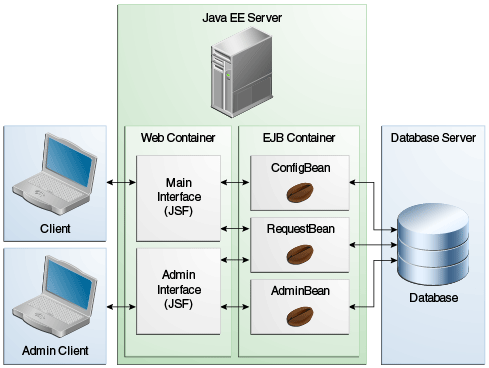The Java EE 7 Tutorial
58.1 Design and Architecture of Duke's Tutoring
Duke's Tutoring is a web application that incorporates several Java EE technologies. It exposes both a main interface (for students, guardians, and tutoring center staff) and an administration interface (for staff to maintain the system). The business logic for both interfaces is provided by enterprise beans. The enterprise beans use the Java Persistence API to create and store the application's data in the database. Figure 58-1 illustrates the architecture of the application.
Figure 58-1 Architecture of the Duke's Tutoring Example Application

Description of "Figure 58-1 Architecture of the Duke's Tutoring Example Application"
The Duke's Tutoring application is organized into two main projects: the dukes-tutoring-common library and the dukes-tutoring-war web application. The dukes-tutoring-common library project contains the entity classes and helper classes used by the dukes-tutoring-war web application, and dukes-tutoring-common is packaged and deployed with dukes-tutoring-war. The library JAR file is useful for allowing the entity classes and helper classes to be reused by other applications, such as a JavaFX client application.
Duke's Tutoring uses the following Java EE 7 platform features:
-
Java Persistence API entities
-
A custom Bean Validation annotation,
@Email, for validating email addresses -
A standard
jta-data-sourcedefinition that will create the JDBC resource on deployment -
A standard property in the
persistence.xmldeployment descriptor to automatically and portably create and delete the tables in thejta-data-source
-
-
Enterprise beans
-
Local, no-interface view session and singleton beans
-
JAX-RS resources in a session bean
-
Java EE security constraints on the administrative interface business methods
-
All enterprise beans packaged within the WAR
-
-
WebSocket
-
Contexts and Dependency Injection
-
JavaServer Faces technology, using Facelets for the web front end
The Duke's Tutoring application has two main user interfaces, both packaged within a single WAR file:
-
The main interface, for students, guardians, and staff
-
The administrative interface used by the staff to manage the students and guardians, and to generate attendance reports

